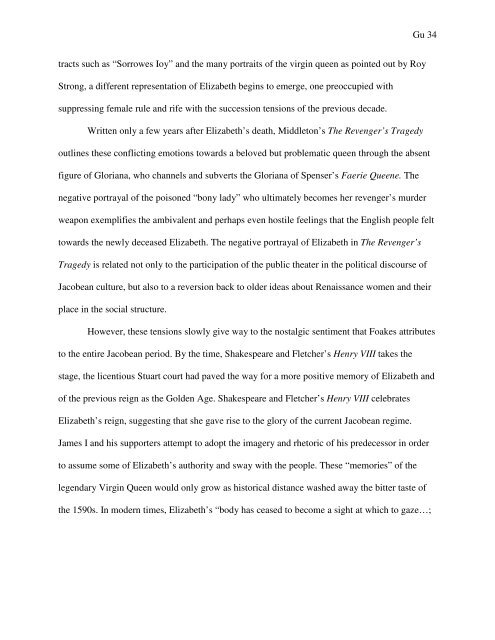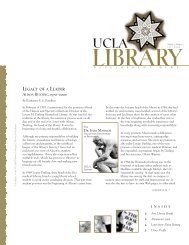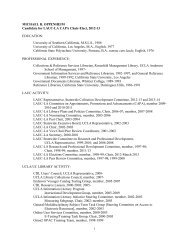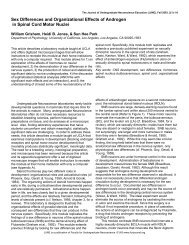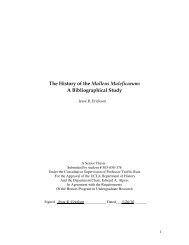Research Paper - UCLA Library
Research Paper - UCLA Library
Research Paper - UCLA Library
You also want an ePaper? Increase the reach of your titles
YUMPU automatically turns print PDFs into web optimized ePapers that Google loves.
tracts such as “Sorrowes Ioy” and the many portraits of the virgin queen as pointed out by Roy<br />
Strong, a different representation of Elizabeth begins to emerge, one preoccupied with<br />
suppressing female rule and rife with the succession tensions of the previous decade.<br />
Written only a few years after Elizabeth’s death, Middleton’s The Revenger’s Tragedy<br />
Gu 34<br />
outlines these conflicting emotions towards a beloved but problematic queen through the absent<br />
figure of Gloriana, who channels and subverts the Gloriana of Spenser’s Faerie Queene. The<br />
negative portrayal of the poisoned “bony lady” who ultimately becomes her revenger’s murder<br />
weapon exemplifies the ambivalent and perhaps even hostile feelings that the English people felt<br />
towards the newly deceased Elizabeth. The negative portrayal of Elizabeth in The Revenger’s<br />
Tragedy is related not only to the participation of the public theater in the political discourse of<br />
Jacobean culture, but also to a reversion back to older ideas about Renaissance women and their<br />
place in the social structure.<br />
However, these tensions slowly give way to the nostalgic sentiment that Foakes attributes<br />
to the entire Jacobean period. By the time, Shakespeare and Fletcher’s Henry VIII takes the<br />
stage, the licentious Stuart court had paved the way for a more positive memory of Elizabeth and<br />
of the previous reign as the Golden Age. Shakespeare and Fletcher’s Henry VIII celebrates<br />
Elizabeth’s reign, suggesting that she gave rise to the glory of the current Jacobean regime.<br />
James I and his supporters attempt to adopt the imagery and rhetoric of his predecessor in order<br />
to assume some of Elizabeth’s authority and sway with the people. These “memories” of the<br />
legendary Virgin Queen would only grow as historical distance washed away the bitter taste of<br />
the 1590s. In modern times, Elizabeth’s “body has ceased to become a sight at which to gaze…;


